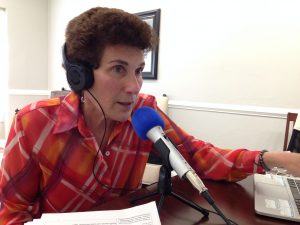A new report claims that Florida’s property insurance market is full of “low quality insurers,” especially those Florida-based companies that write the bulk of the 7.5 million homeowners and condo insurance policies. It casts aspersions on Demotech, the rating agency that reviews their financial stability.
Former Florida Deputy Insurance Commissioner Lisa Miller sat down with Demotech President Joe Petrelli to get the other side of the story that the report didn’t. She also learned that it wasn’t low capital and surplus that led to seven company insolvencies, as the report claims, but instead targeted technology-enabled claim instigation.
Show Notes
The report, When Insurers Exit: Climate Losses, Fragile Insurers, and Mortgage Markets was written by researchers at Columbia University, Harvard University, and the Federal Reserve Board and published online prior to being peer reviewed. The report’s abstract describes it as a study of how homeowners insurance markets respond to growing climate losses and how this impacts the home mortgage markets.
“Using Florida as a case study, we show that traditional insurers are exiting high risk areas, and new lower quality insurers are entering and filling the gap. These new insurers service the riskiest areas, are less diversified, hold less capital, and 20 percent of them become insolvent. We trace their growth to a lax insurance regulatory environment. Yet, despite their low quality, these insurers secure high financial stability ratings, not from traditional rating agencies, but from emerging rating agencies.”

Joe Petrelli, President of Demotech. Courtesy, Demotech
The report specifically targets rating agency Demotech, which provides Financial Stability Ratings (FSR) for most of the 50 or so Florida-based property insurance companies, including six of the recent eight carriers to enter the market. The report claims Demotech’s ratings “are high enough to meet the minimum rating requirements” of Fannie Mae and Freddie Mac, which back many home mortgages, but that most of those insurance companies wouldn’t meet government requirements if rated by AM Best, suggesting the companies are financially weak.
“I think the thing to keep in mind is the report is based on what are called counterfactual AM Best ratings of Demotech-rated companies,” said Joe Petrelli, President of Demotech, who described counterfactual methods as those based on “what-if” scenarios. “So I think that, in and of itself, should have alerted people that this was not based on anything real or actual. It was based on counterfactual information. It’s like rewinding the world, changing a few crucial details, and then hitting play to see what happens. It’s essentially a simulation,” said Petrelli.
Petrelli is an actuary and a 55-year veteran of the insurance industry. He and wife Sharon co-founded Demotech in 1985 and today the agency reviews and rates 460 insurance companies across America. It is registered with the U.S. Securities and Exchange Commission as a nationally-recognized statistical rating organization for insurance companies. Florida regulators approached Demotech in 1995 to become the very first ratings company to review and rate independent, regional and specialty companies that filled the gap left by legacy property insurance carriers that fled the state after losses from 1992’s Hurricane Andew. Demotech has been rating Florida-based companies and others ever since. Under state law, an insurance company’s finances must be reviewed every five years, regardless of its size. On top of that, “Every company we work with gets an inquiry or a letter periodically, especially when there’s financial information to be reviewed,” he said.

Lisa Miller, Host of The Florida Insurance Roundup podcast
Petrelli said one of the report’s authors contacted him by email in June of 2023 to request information. He said he replied with his mobile number and an invitation to call, but never received a call or reply. He found out about the report in March 2024, three months after its listed publish date. “That’s even more puzzling that you, Demotech, and any of your emissaries were not given the opportunity to have a sit-down discussion with these academicians who wrote this 60-some-odd page report,” said host Miller, who added that “another troubling feature” was the report being made public prior to peer review.
The report said the lower level of capital and surplus of Florida-based companies compared to larger national legacy carriers led to insolvencies of seven of them in a 14-month period in 2022 to 2023. While capital and surplus levels are important, said Petrelli, they overlook the real reasons for those seven companies going insolvent and closing.
“Those Florida-based companies were being targeted through tech-enabled claim instigation. They were being targeted by artificial intelligence platforms,” said Petrelli. “We’re talking about litigation financing, we’re talking about litigation marketing firms who would help find claimants, and we’re talking about search engine optimization being used online. With their tiny market share of Florida, those seven companies in 2021 had double the number of new litigated claims than the entire state of California had that year in its $12 billion homeowners insurance market.”
The report found it unusual that Florida-based companies purchase the large amount of reinsurance they do and what they spent for it. “That was the other fascinating thing to me in the report,” said Petrelli. “I kind of think that’s a good thing in a catastrophe prone area. More reinsurance is always better than less if you’re an insurance company in Florida.”
Host Miller noted that due to hurricanes, Florida has the highest catastrophic risk of any state in America. The accompanying higher reinsurance costs translate to high property insurance costs for consumers. “Add in a lawsuit-happy environment, where at last count, Florida had just under 15% of the homeowners insurance claims in the country yet nearly 71% of the homeowners insurance lawsuits filed, and you have a recipe for a very challenging marketplace,” said Miller.
Miller said the past three years of insurance market reforms passed by the Florida Legislature and signed into law by Governor Ron DeSantis are showing encouraging results now:
- Florida-based property insurance companies collectively showed a positive net income in 2023 for the first time in seven years;
- Those companies reported lower loss reserve development at year-end 2023 than in 2022 by nearly 45%;
- Reinsurance costs have moderated;
- Litigation is easing, but still outpaces the U.S. average in legal defense costs; and
- The rate increases sought by companies are smaller, with one company recently announcing a 2% average statewide rate decrease for homeowners and condominium policies.
Eight new companies have come into Florida in the past 12 months to begin writing homeowners insurance. They are helping fill the gap left by the seven companies that became insolvent.
“That’s how you attract capital. You give them a chance to make money,” said Petrelli, of the eight new companies in the market writing homeowners policies. “I think all these reforms have been exceptional and beneficial to consumers as well as to the insurance companies, and ultimately the reinsurance community will see that,” he added.
While there may be modest rate decreases by some insurance companies down the road as legislative reforms take full effect, Petrelli said market stabilization to him means more modest rate increases. “We should all remember that the price of tar paper goes up, the hourly wages of the skilled craftsmen that fix our houses go up, the cost of rugs is going up, roof shingles is going up, and glass is going up. So we should expect in the long run, moderate increases. But if you get a rate decrease now and again, enjoy it.”
Links and Resources Mentioned in this Episode
When Insurers Exit: Climate Losses, Fragile Insurers, and Mortgage Markets (SSRN)
Florida’s Home Insurance Industry May Be Worse Than Anyone Realizes (Bloomberg, April 24, 2024)
Florida insurance market full of ‘low quality’ companies, study finds (Tampa Bay Times, April 12, 2024)
The complex math of counterfactuals (Technology Review, April 4, 2024)
Property Insurance Stability Report (Florida Office of Insurance Regulation, January 1, 2024)
Property Insurance Reforms ‘Having Positive Impact’ (LMA Newsletter of January 8, 2024)
Fla. property insurers post income turnaround in 2023 (S&P Global Market Intelligence, March 19, 2024)
Positive Signs in Fla’s Property Insurance Market (LMA Newsletter of April 8, 2024)
Florida Peninsula Insurance Company will lower rates by an average of 2 percent (News Service of Florida, April 11, 2024)
The Next Big Litigation Threat (LMA Newsletter of July 10, 2023)
Subscribe to the LMA Newsletter (free)
** The Listener Call-In Line for your recorded questions and comments to air in future episodes is 850-388-8002 or you may send email to [email protected] **
The Florida Insurance Roundup from Lisa Miller & Associates, brings you the latest developments in Property & Casualty, Healthcare, Workers’ Compensation, and Surplus Lines insurance from around the Sunshine State. Based in the state capital of Tallahassee, Lisa Miller & Associates provides its clients with focused, intelligent, and cost conscious solutions to their business development, government consulting, and public relations needs. On the web at www.LisaMillerAssociates.com or call 850-222-1041. Your questions, comments, and suggestions are welcome! Date of Recording 4/19/2024. Email via [email protected] Composer: www.TeleDirections.com © Copyright 2017-2024 Lisa Miller & Associates, All Rights Reserved


